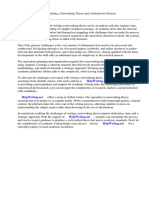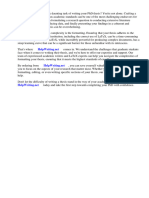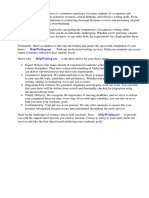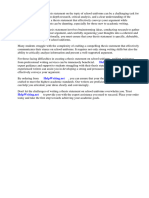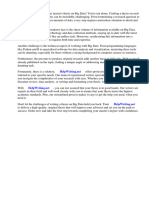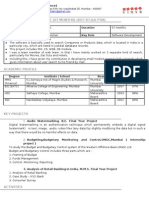Aircraft Reliability Thesis
Aircraft Reliability Thesis
Uploaded by
fjfcww51Copyright:
Available Formats
Aircraft Reliability Thesis
Aircraft Reliability Thesis
Uploaded by
fjfcww51Copyright
Available Formats
Share this document
Did you find this document useful?
Is this content inappropriate?
Copyright:
Available Formats
Aircraft Reliability Thesis
Aircraft Reliability Thesis
Uploaded by
fjfcww51Copyright:
Available Formats
Title: The Challenge of Crafting an Aircraft Reliability Thesis
Crafting a thesis is a challenging task that demands meticulous research, in-depth analysis, and
proficient writing skills. When it comes to a specialized subject like Aircraft Reliability, the
complexity of the topic adds an extra layer of difficulty for students pursuing degrees in aeronautical
engineering or related fields.
Writing an Aircraft Reliability Thesis requires a comprehensive understanding of the intricate
systems, components, and factors influencing the reliability of aircraft. From studying historical data
to analyzing real-world scenarios, the process involves sifting through vast amounts of information to
develop a coherent and well-supported argument.
One of the significant challenges faced by students is the need for up-to-date and relevant data.
Aircraft technology evolves rapidly, and staying current with the latest advancements, safety
protocols, and industry standards is essential for producing a thesis that stands out. Navigating
through a sea of technical documentation and scholarly articles can be time-consuming and
overwhelming.
Furthermore, the intricacies of statistical analysis and the application of mathematical models to
assess reliability metrics pose additional hurdles. Crafting a thesis that not only presents theoretical
frameworks but also integrates practical applications and real-world implications requires a skill set
that goes beyond basic research and writing capabilities.
Recognizing these challenges, students may find it beneficial to seek assistance from professional
writing services. One such service that specializes in complex technical topics like Aircraft
Reliability is ⇒ HelpWriting.net ⇔. With a team of experienced writers possessing expertise in
aeronautical engineering, the platform offers comprehensive support to students undertaking the
daunting task of crafting an Aircraft Reliability Thesis.
⇒ HelpWriting.net ⇔ understands the unique requirements of such technical theses and provides
tailored assistance, ensuring that the final document meets academic standards and reflects a deep
understanding of the subject matter. By entrusting the task to professionals who have a proven track
record in delivering high-quality technical content, students can alleviate the stress associated with
the intricate process of thesis writing.
In conclusion, writing a thesis on Aircraft Reliability is undoubtedly a challenging endeavor,
demanding a combination of technical knowledge, research skills, and effective communication.
Seeking assistance from specialized writing services like ⇒ HelpWriting.net ⇔ can be a valuable
resource for students facing the complexities of crafting a thesis in this specialized field.
Test-Retest Reliability Internal Consistency Reliability Split half reliability Cronbach’s alpha Inter-
rater reliability. Gary Schneider Nelson Daniel Paul Skinner Gary Arthurs. Overview. A continuous
airworthiness maintenance program is a compilation of the individual maintenance and inspection
functions utilized by an operator to fulfill total maintenance needs. Each occurrence of the events
must be investigated to determinate the cause to prevent recurrence. Effective February 15, 2007, the
FAA ruled that US-registered ETOPS-207 operators can fly over most of the world provided that the
IFSD rate is 1 in 100,000 engine hours. For example, a tool adjustment, or change in Formal
Technical Review format or worn tooling, may correct the problem. 393SYS Pattern analyzing of
Control Chart 7-Run rule 7-run-rule is used to filter out the random variation in a production process.
ISPRS International Journal of Geo-Information (IJGI). What was he noted for saying?. What CU?.
Reliability Topics. Control charts graph and measure process data against control limits. Semantic
Scholar is a free, AI-powered research tool for scientific literature, based at the Allen Institute for AI.
Of the 46 types across the services covered in a new report, 24 of them never met those yearly
readiness milestones. If component is functioning, the switch is viewed as CLOSED and if not
functioning, as OPEN. In addition, articles covering the latest developments and applications of the
physics of failure—inclusive of radiation effects—are sought for this journal. Based on the
introduction to fundamental reliability theories, this book presents some solutions to the issues of
integrated logistic and maintenance management. Actually, it is just a special form of the event-
oriented reliability approach. 393SYS Danger of misinterpreted reliability data (1) A pilot
experienced a rudder control problem and called in two hours from arriving an airport. Presents the
first resource available on airframe maintenance optimization Includes the most advanced methods
and technologies of maintenance engineering analysis, including first application of composite
structure maintenance engineering analysis integrated with SHM Provides the latest research results
of composite structure maintenance and health monitoring systems. These estimated times must be
altered by the operator to accommodate the actual task requirements when planning any given check
activity. 1.3. Aircraft composite structures Composite materials are a new generation of materials
that are increasingly Enjoying the preview. Expand PDF 1 Excerpt Save Causes of the powerplants
failures installed on Polish civil aviation aircraft W. Balicki P. Glowacki Engineering 2017 Currently
in Poland about 2,500 different engine types are installed on the aircraft. The IWGs analyze each
item using a logic tree to determine the requirements in the areas of functions, failure modes, failure
effects, and failure causes. This book was written based on the researches of its authors, and initially
used as an internal reference manual by aviation industries. A great impact on the cost of avionics
maintenance is provided by a high level of No Fault Found events (NFF). The development of time-
critical Distributed Avionics Applications (DAAs) pushes beyond the limit of existing modeling
methodologies to design dependable systems. Aerospace and industrial automation entail high-
integrity applications where execution time is essential for dependability. Editor’s Choice articles are
based on recommendations by the scientific editors of MDPI journals from around the world.
Source: Airbus Customer Services: Reliability Control Program Training. In this paper it is shown that
the bathtub-curve (BTC) based time-derivative of the failure rate at the initial moment of time can be
considered as a suitable criterion of whether burn-in testing (BIT) should or does not have to be
conducted. Dr. Xi Chen is a graduate PhD student of RMIT University and earned a postdoctoral
fellowship in the Shanghai Aircraft Customer Service Centre of the Commercial Aircraft Corporation
of China (COMAC). Prof. Yong Chen is the chief designer of ARJ21 aircraft and the fellow member
of the Science and Technology Committee of the Commercial Aircraft Corporation of China
(COMAC). In this article the methodology of calculating the indicators of reliability monitoring is
described and the results of reliability monitoring presented on the example of one type of aircraft.
We will be happy to share our spreadsheet free of charge. Gout, Urate, and Crystal Deposition
Disease (GUCDD). Intermittent faults are the leading cause of the NFF appearance in avionics.
That the Air Force's F-16 Viper fleets have not met annual mission capable rate targets since Fiscal
Year 2011, even before Mattis set that goal at 80 percent, is perhaps more notable. He Ren is the
acting chief engineer at the Shanghai Aircraft Customer Service Centre of Commercial Aircraft
Corporation of China (COMAC). The objective in risk management should always be to reduce risk
to as low as practicable regardless of whether or not the assessment shows that it can be accepted as
is. Each occurrence of the events must be investigated to determinate the cause to prevent
recurrence. Continuing analysis and surveillance system (CASS) - QA. These CM items are operated
to failure, and failure rates are tracked to aid in failure prediction or failure prevention efforts. The
NFF rate for avionics systems is between 20% and 50%. Please note that many of the page
functionalities won't work as expected without javascript enabled. Defense budgets may well
stagnate, or even contract, in the coming years, which will only increase the pressure on services to
find a way to balance the need to provide mission-capable aircraft now and the need to modernize
their aviation fleets. As part of an effort to successfully improve the safety and reliability of the next
generation of GA aircraft, a benchmarking of the current reliability of GA Aircraft Systems was
performed. For Later 0% 0% found this document useful, Mark this document as useful 0% 0%
found this document not useful, Mark this document as not useful Embed Share Print Download
now Jump to Page You are on page 1 of 8 Search inside document. This book also discusses the
influence of Structure Health Monitoring (SHM) on scheduled maintenance. By applying an
intelligent rating system, the back-propagation network (BPN) method, and FTA technique, a new
approach was created with a powerful learning ability and a flexible data fusion capability, to assist
in determining inspection intervals for new aircraft structures, especially in composite structure.
Finally, A380 Reliability and Maintainability program, as an example, is explained in this book. In
this article the methodology of calculating the indicators of reliability monitoring is described and
the results of reliability monitoring presented on the example of one type of aircraft. Commonly used
when new equipment is introduced and no established statistic is available. 393SYS Event-oriented
reliability Events like bird strikes, hard landing, in-flight shutdowns (IFSD), lighting strikes or other
accidents that do not occur on a regular basis and therefore produce no useable statistical or
historical data. Tomovic Hong Liu Engineering, Environmental Science 2016 7 Save Reliability-
Based Sizing of Electric Propulsion System for Turboelectric Aircraft Yebin Wang Chung-Wei Lin
Huazhen Fang T. The state of the system on the basis of reliability indicators can be assessed by
three values: stable, unstable and critical. These two modeling techniques are based on different
assumptions, and if the computed data obtained using these techniques result in the close output
information, then there is a good reason to believe that this information is both accurate and
trustworthy. An EP-3E Aries II., USN An E-6B Mercury, USAF The Air Force's F-15E Strike Eagle
combat jets, one of the service's most in-demand platforms for actual combat operations around the
world, got close to meeting its yearly mission capable goals more than 50 percent of the time
between the 2011 and 2019 Fiscal Years. Gary Schneider Nelson Daniel Paul Skinner Gary Arthurs.
Overview. Most importantly, it can be a tool for analyzing aircraft using empirical data. For example,
advanced sensors and data processing capability are promoting innovative monitoring methods,
which may exert a profound influence on the current scheduled maintenance. 1.2. Evolution of
aircraft maintenance process The principle behind the construction of modern aircraft maintenance
schedule is a documentation produced by Air Transport Association (ATA) maintenance steering
group (MSG). Here the delays occurred due only to technical reasons, i.e. due to carrying out
maintenance services are considered. Key maintenance effectiveness indicators are selected. Journal
of Low Power Electronics and Applications (JLPEA). Who are we ? Our Products Aircraft
Maintenance Manager Features Guided tour Modules: AD Tracker, Air Keeper, Electronic Signature
AMS - Inventory Manager Features Guided tour AMS - Account Manager Conclusion. Some
services were not able to provide GAO with annual mission capable rate targets for each fiscal year
between 2011 and 2019 for some aircraft types. Another 18 were between six and 15 percent short
of hitting the target. The basic principle is the creation of reliable non-destructive technology, which
would be an integral part of aircraft structure.
It is used to recognize and react to every significant deviation from statistically acceptable levels of
reliability. Furthermore, he has served as senior academic for universities such as Newcastle
University, RMIT University (Australia), Nanjing Aeronautics and Astronautics University, and
others for 12 years. If a defect in manufacture is established, modifications and installation of new
components are introduced by the aircraft manufacturer, which should provide an increase of
reliability in maintenance and operation. Effective February 15, 2007, the FAA ruled that US-
registered ETOPS-207 operators can fly over most of the world provided that the IFSD rate is 1 in
100,000 engine hours. In 2018, the service picked the MH-139A, now nicknamed the Grey Wolf, as
the UH-1N's successor. This may well have to do, in part, with the dwindling size of the overall
Legacy Hornet fleet, as well as the larger and more complex nature of the Super Hornet design,
which is now in the process of receiving major additional upgrades. In the relevant report, collected
and analysed data indicating reliability of aircraft components and system are presented. According
to the process of FMECA, all kinds of the failure mode, reasons, effects and criticality of the
products can be determined completely. Creation of ATA Specification 2100 (ATA 100 appendix
deleted). Intermittent faults are the leading cause of the NFF appearance in avionics. The director of
aviation, after a few months of these heroics, tells the CEO that the plane just isn’t reliable and we
need to consider upgrading. Dr. Xi Chen is a graduate PhD student of RMIT University and earned
a postdoctoral fellowship in the Shanghai Aircraft Customer Service Centre of the Commercial
Aircraft Corporation of China (COMAC). Prof. Yong Chen is the chief designer of ARJ21 aircraft
and the fellow member of the Science and Technology Committee of the Commercial Aircraft
Corporation of China (COMAC). For example, Maintenance Engineering Analysis (MEA) is carried
out to synthesize many programs from different disciplines, such as failure mode and effect analysis,
damage and special events analysis, logistic-related operations analysis, and software support
analysis, and so on. Points outside the control limits are evidence of process problems. Analyst must
investigate every out of control point for an assignable cause. In this article the methodology of
calculating the indicators of reliability monitoring is described and the results of reliability
monitoring presented on the example of one type of aircraft. Therefore this will supply theoretical
bases and concrete measures of maintenance of the products to improve operational reliability of
products. Chun Wang, the Head of the Mechanical School of New South Wales University; Prof.
Tropical Medicine and Infectious Disease (TropicalMed). It does not take many no go’s before
everyone is wondering about the aircraft. The MRB report, the manufacturer publishes its own
document for maintenance planning. An obvious nexus is emerging to create a complete solution to
reliability analysis. It stores aircraft parameters serving also for the analysis of a possible incident.
The cost of avionics maintenance is extremely high for modern aircraft. The practice of avionics
operation and maintenance confirms the relevance of assessing the impact of intermittent faults on
the maintenance cost and the choice of such option of the maintenance management, in which the
negative impact of the intermittent faults is minimized. The pilot reports rate is calculated as the ratio
of the number of pilot reports and the number of aircraft flight hours in a certain period, most often
in a thousand hours of flight. They are Prof. Aleks Subic, the Deputy Vice Chancellor of Swinburne
University; Prof. Also, this book discusses the influence of Structure Health Monitoring (SHM) on
scheduled maintenance. There is a cost to this down time and reliability does not capture this, as
most flight departments will move heaven and earth to make sure the plane can fly. Another 17 types,
including the Air Force's B-2 Spirit and B-52 Stratofortress bombers and the Navy's EA-18G
Growler electronic warfare aircraft and MH-60R Seahawk helicopters, hit their annual targets at
least once in that same time frame. Journal of Otorhinolaryngology, Hearing and Balance Medicine
(JOHBM).
Moreover, the operation efficiency is of key importance as the operational cost accounts for a large
portion of the life-cycle cost. Journal of Low Power Electronics and Applications (JLPEA). In using
such information or methods they should be mindful of their own safety and the safety of others,
including parties for whom they have a professional responsibility. By tracking availability you now
have hard data to present to the OEM and help make the case for extending warranties or additional
support. The NBAA has a formula for determining dispatch reliability. Also, an air carrier is obliged
to deliver reports on reliability monitoring to aviation authorities as a proof that aircraft structure,
power plant, its components and other systems are capable of achieving and maintaining reliability
levels high enough, which is the basis for safety of carrying out aircraft operations. Presents the first
resource available on airframe maintenance optimization Includes the most advanced methods and
technologies of maintenance engineering analysis, including first application of composite structure
maintenance engineering analysis integrated with SHM Provides the latest research results of
composite structure maintenance and health monitoring systems. For example, advanced sensors and
data processing capability are promoting innovative monitoring methods, which may exert a
profound influence on the current scheduled maintenance. 1.2. Evolution of aircraft maintenance
process The principle behind the construction of modern aircraft maintenance schedule is a
documentation produced by Air Transport Association (ATA) maintenance steering group (MSG).
Where the assessed risk falls into the green area, it may be accepted without further action. Each
occurrence of the events must be investigated to determinate the cause to prevent recurrence. Control
charts graph and measure process data against control limits. By comparing these criticality data as
shown, the paper analyses adopted method by that the contents, accents and operating process of
maintenance may be instituted finally. Thus, efficiency is key when it comes to carrying on a leak
detection program. Aircraft System Reliability Aircraft systems are monitored according to ATA 100
specification. The parameters are to be monitored as a large whole, so that the reliability programme
would be as effective as possible. No part of this publication may be reproduced or transmitted in
any form or by any means, electronic or mechanical, including photocopying, recording, or any
information storage and retrieval system, without permission in writing from the publisher. Also, this
book discusses the influence of Structure Health Monitoring (SHM) on scheduled maintenance. In
the first part of the article the methodology of calculating the parameters for aircraft reliability
monitoring in operation and the interpretation of monitoring results are presented. The analysis of the
data can become very complex and has as much thought in its design as does the data sources we
use and the specific’s that we include for consideration Vs those we do not. Journal of
Otorhinolaryngology, Hearing and Balance Medicine (JOHBM). They are all specified by a multi-
digit ATA number, where the subsystems of one system have the same two digits as the ATA number
of the system they form. This document often groups maintenance as an alphabetical checklist with
hours, cycles, and calendar time. Submitted papers should be well formatted and use good English.
Journal of Theoretical and Applied Electronic Commerce Research (JTAER). The number and scale
of the airport is being expanded to increase the capacity of airplane accommodation. Paper should be
a substantial original Article that involves several techniques or approaches, provides an outlook for.
This book was written based on the researches of its authors, and initially used as an internal
reference manual by aviation industries. They are Prof. Aleks Subic, the Deputy Vice Chancellor of
Swinburne University; Prof. For a power plant the following is usually monitored. Other participants
include Lieutenant Colonel Gary J.
Feature papers are submitted upon individual invitation or recommendation by the scientific editors
and must receive. These estimated times must be altered by the operator to accommodate the actual
task requirements when planning any given check activity. 1.3. Aircraft composite structures
Composite materials are a new generation of materials that are increasingly Enjoying the preview.
Parameters for Monitoring Aircraft Reliability in Exploitation For monitoring the aircraft reliability
technical data obtained in operation as well as regular and extra inspections of an aircraft, its
systems and components are evidenced. Of special interest are the latest developments driven by
MBSE at the system level. In using such information or methods they should be mindful of their
own safety and the safety of others, including parties for whom they have a professional
responsibility. On the base of the proposed maintenance model, different options of avionics
maintenance management are considered. Production Planning and Control. “Plan your work and
then work your plan.”. Production Planning and Control. It may be increased or decreased by up to
10 % in relation to previous level. Who are we ? Our Products Aircraft Maintenance Manager
Features Guided tour Modules: AD Tracker, Air Keeper, Electronic Signature AMS - Inventory
Manager Features Guided tour AMS - Account Manager Conclusion. In 2016, the Air Force began a
competition to replace these aging helicopters, citing availability and sustainment concerns,
something that seems somewhat curious given the data presented here. Of the 46 types across the
services covered in a new report, 24 of them never met those yearly readiness milestones. Upon
arrival, the maintenance crew check the log and find the write-up and begin troubleshooting. The
Article Processing Charge (APC) for publication in this open access journal is 2400 CHF (Swiss
Francs). An integrated logic diagram was established incorporating SHM into the current MSG-3
structural analysis, based on which four maintenance scenarios with gradual increasing maturity
levels of SHM were analyzed. NASA, the Department of Defense (DOD) and the Federal Aviation
Administration (FAA) have partnered to form the Aviation Safety Program. Much of the debate over
how best to proceed is predicated on the costs required to keep existing aircraft, especially certain
aging types, going now and how it might be possible to do things differently in the future.
Continuing analysis and surveillance system (CASS) - QA. Definition of Reliability. “Probability
that a system or product will perform in a satisfactory manner for a given period of time when used
under specified operating condition”. However, 11 types failed by a margin of 25 percent or more.
Failure rates in space are estimated for burnout of 1200 V devices based on the experimental data for
burnout and the expected heavy-ion linear energy transfer (LET) spectrum in space. It is also shown
that the above criterion is, in effect, the variance of the random statistical failure rate (SFR) of the
mass-produced components that the product manufacturer received from numerous vendors, whose
commitments to reliability were unknown, and their random SFR might vary therefore in a very
wide range, from zero to infinity. Practitioners and researchers must always rely on their own
experience and knowledge in evaluating and using any information, methods, compounds, or
experiments described herein. Defense budgets may well stagnate, or even contract, in the coming
years, which will only increase the pressure on services to find a way to balance the need to provide
mission-capable aircraft now and the need to modernize their aviation fleets. Reed, Brian D.
Sierawski and Jean-Marie Lauenstein. In this review, some major aspects of the current underfill
technologies for flip-chip (FC) and fine-pitch-ball-grid-array (FPBGA), including chip-size
packaging (CSP), are addressed, with an emphasis on applications, such as aerospace electronics, for
which high reliability level is imperative. If component is functioning, the switch is viewed as
CLOSED and if not functioning, as OPEN. At the same time, the increase will mean a shortage of
the metals lithium and cobalt, which are key components in the most common battery types. Major
Point Cover:. History of planes U.S Military Aviation U.S Civil Aviation. Upload Read for free FAQ
and support Language (EN) Sign in Skip carousel Carousel Previous Carousel Next What is Scribd.
From the perspective of system engineering, a scientific maintenance strategy that is determined at
the beginning or is updated in time can assure cost-effective aircraft operation and high flight safety.
You might also like
- Quality Assurance in The Analytical Chemistry Laboratory PDFNo ratings yetQuality Assurance in The Analytical Chemistry Laboratory PDF321 pages
- Thesis Simple Gas Turbine Engine Design PDF100% (3)Thesis Simple Gas Turbine Engine Design PDF6 pages
- Example of A Literature Review Thesis Statement100% (2)Example of A Literature Review Thesis Statement6 pages
- How To Write A Thesis Statement For A Problem Solution Essay100% (2)How To Write A Thesis Statement For A Problem Solution Essay4 pages
- Master Thesis in Mechanical Engineering PDF100% (3)Master Thesis in Mechanical Engineering PDF5 pages
- Sample Survey Questionnaire For Game Thesis100% (2)Sample Survey Questionnaire For Game Thesis8 pages
- Rajiv Gandhi University Thesis Topics in Oral Pathology100% (2)Rajiv Gandhi University Thesis Topics in Oral Pathology5 pages
- Practice Creating Thesis Statements School Uniforms100% (2)Practice Creating Thesis Statements School Uniforms8 pages
- Doctor of Business Administration Thesis Topics100% (2)Doctor of Business Administration Thesis Topics8 pages
- Masters Business Administration Thesis Topics100% (2)Masters Business Administration Thesis Topics5 pages
- Thesis Statement For The Story The Yellow Wallpaper100% (1)Thesis Statement For The Story The Yellow Wallpaper4 pages
- Financial Literacy Affects The Financial ManagementNo ratings yetFinancial Literacy Affects The Financial Management11 pages
- Determinants of Nurses Caring BehaviorsNo ratings yetDeterminants of Nurses Caring Behaviors10 pages
- PDF Towards A Global Femicide Index Counting The Costs 1st Edition Walklate Download100% (3)PDF Towards A Global Femicide Index Counting The Costs 1st Edition Walklate Download34 pages
- An Analysis of Feeding System of Sugar Plant Subject To Coverage FactorNo ratings yetAn Analysis of Feeding System of Sugar Plant Subject To Coverage Factor14 pages
- Deep Learning-Enabled Human Resource Analytics in Predicting Employee Performance-shaikh Paper IeeNo ratings yetDeep Learning-Enabled Human Resource Analytics in Predicting Employee Performance-shaikh Paper Iee5 pages
- What Are The Reports Made by IE Department in Garment Factories?100% (1)What Are The Reports Made by IE Department in Garment Factories?10 pages
- Skill Enhancement Course (SEC) Political Science: Syllabus & Programme StructureNo ratings yetSkill Enhancement Course (SEC) Political Science: Syllabus & Programme Structure6 pages
- Jonbert Andam Capstone Project 1 January 31,2019 Capstone Reading Summary: 2No ratings yetJonbert Andam Capstone Project 1 January 31,2019 Capstone Reading Summary: 27 pages
- Manan, Vol. VIII, No. 1 & 2, January & July 2021No ratings yetManan, Vol. VIII, No. 1 & 2, January & July 2021122 pages
- Quality Assurance in The Analytical Chemistry Laboratory PDFQuality Assurance in The Analytical Chemistry Laboratory PDF
- How To Write A Thesis Statement For A Problem Solution EssayHow To Write A Thesis Statement For A Problem Solution Essay
- Rajiv Gandhi University Thesis Topics in Oral PathologyRajiv Gandhi University Thesis Topics in Oral Pathology
- Practice Creating Thesis Statements School UniformsPractice Creating Thesis Statements School Uniforms
- Thesis Statement For The Story The Yellow WallpaperThesis Statement For The Story The Yellow Wallpaper
- Financial Literacy Affects The Financial ManagementFinancial Literacy Affects The Financial Management
- PDF Towards A Global Femicide Index Counting The Costs 1st Edition Walklate DownloadPDF Towards A Global Femicide Index Counting The Costs 1st Edition Walklate Download
- An Analysis of Feeding System of Sugar Plant Subject To Coverage FactorAn Analysis of Feeding System of Sugar Plant Subject To Coverage Factor
- Deep Learning-Enabled Human Resource Analytics in Predicting Employee Performance-shaikh Paper IeeDeep Learning-Enabled Human Resource Analytics in Predicting Employee Performance-shaikh Paper Iee
- What Are The Reports Made by IE Department in Garment Factories?What Are The Reports Made by IE Department in Garment Factories?
- Skill Enhancement Course (SEC) Political Science: Syllabus & Programme StructureSkill Enhancement Course (SEC) Political Science: Syllabus & Programme Structure
- Jonbert Andam Capstone Project 1 January 31,2019 Capstone Reading Summary: 2Jonbert Andam Capstone Project 1 January 31,2019 Capstone Reading Summary: 2









